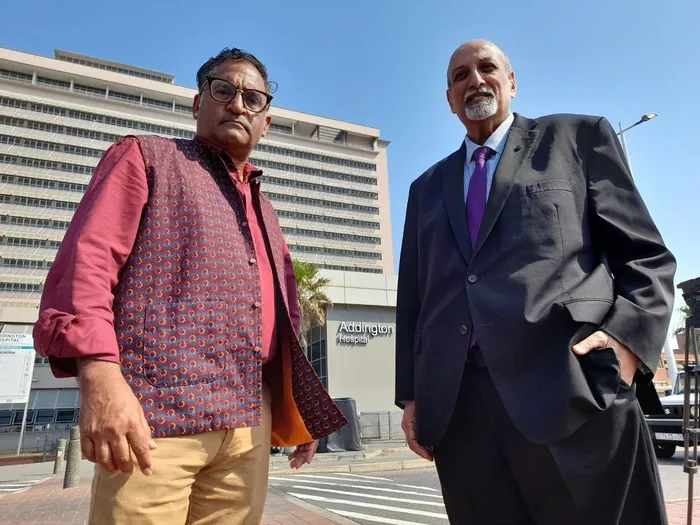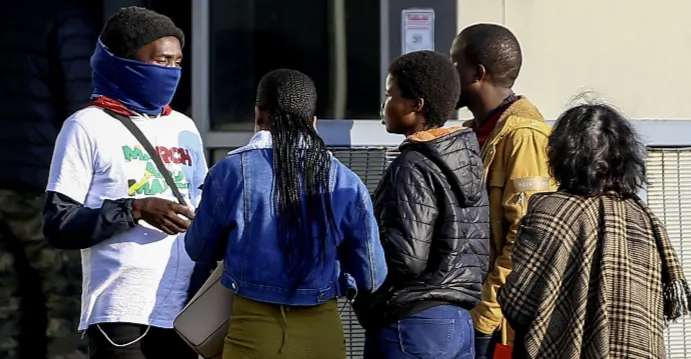
Dr Raymond Perrier the director of the Dennis Hurley Centre and public health expert, Professor Salim Abdool Karim, outside Addington Hospital where they confronted vigilantes preventing foreigners from accessing medical care.
Image: Supplied.
In the past few weeks, individuals identified as members of an organisation which calls itself March to March have stood at the entrance of public hospitals, particularly Addington Hospital in Durban, demanding to see the ID documents of all patients and visitors.
They have prevented entry to the hospital of at least the following categories of persons: those who either do not possess a South African ID document, or refuse to show them one; SA ID holders whose ID documents have been lost or stolen; SA ID holders who were born outside SA, and the children/grandchildren of parents/grandparents who are SA citizens but were born outside SA; and a disabled SA-born child whose mother, the holder of a green bar-coded ID, was born outside SA but resident in SA for twenty years.
This organisation makes various claims to support their conduct by claiming that they are enforcing the law by turning away undocumented persons or ‘foreigners’, who are not entitled to the services of the hospital because they are ‘illegal’. They say they are following the Constitution, in particular, sections 7 (Rights) and 27 (Health care, food, water and social security) by their actions.
They believe that ‘foreigners’ are causing overcrowding in hospitals, affecting the rights of South Africans seeking health care services. They are allowing ‘emergency’ patients irrespective of ID status.
Our organisations wish to make it clear that not only are these actions misguided and illegal, but their reasoning is flawed and the understanding of the Constitution and the National Health Act incorrect.
Firstly, these self-appointed guardians of the hospital gates have no authority either to ‘police’ the hospital entrance nor demand proof of identity of any person. They do not have the authority to declare anyone ‘illegal’.
Secondly, there is no evidence that the cause of overcrowding in hospitals, as reported in some media, is the influx of ‘foreigners’.

A member of the March and March movement checks the identity document and appointment cards at the entrance of the Addington Hospital.
Image: Leon Lestrade/Independent Newspapers
Thirdly, there is no evidence that the easing of pressure and the positive experiences of some patients and staff, as reported in some media, is due to the barring from these facilities of so-called illegal foreigners. How many undocumented South Africans and those who refuse to comply with an illegal order have been shut out, thereby easing the congestion inside the hospital?
Finally, they do not have the competence to determine who is an emergency patient and therefore eligible for access to the hospital.
As there has been some confusion around what the law (the Constitution of South Africa and the National Health Act) says about access to health care services, we clarify the position here.
Section 7 of the Constitution ‘enshrines the rights of all the people in our country’. No distinction is made between citizens, holders of some form of SA ID, those with one or other form of residency, and indeed those without any documentation or one of a foreign country. If they are in the country, they have these rights. This is no accident. The drafters of the Constitution, in their wisdom, based these clauses on an affirmation of ‘the democratic values of human dignity, equality and freedom’ for all.
Section 7 also requires the state to respect, protect, promote and fulfil the rights in the Bill of Rights. This means that the state and its organs must not only do nothing to harm these rights, but also actively protect (when a harm is committed), promote (encourage everyone to honour these rights) and fulfil them (by implementing the necessary measures to realise these rights). These rights are not absolute, but subject to certain limitations.
Section 8 (Application of the Bill of Rights) is not only binding on the legislature, executive, judiciary and all organs of state, but also on natural (individuals) and juristic persons (including companies and associations of persons).
In this context all relevant parties in the present scenario (March to March, the Minister of Police, the South African Police Services, hospital authorities, and any individual) may not act in a manner that harms anyone’s enjoyment of these rights.
Section 27(1)(a) states that ‘everyone has the right to have access to health care services, including reproductive health care’. Again, it is a right of access that is available to everyone, with no qualification. As reproductive health care is specifically mentioned, this includes (though is not limited to) pregnant women seeking services, without any qualification.
Section 27(2) requires the state to take reasonable legislative and other measures (such as laws like the National Health Act, or policies like free provision of antiretrovirals for the treatment of HIV infection). This is to be done within its available resources (what is possible within its budget), and to achieve the progressive realisation of these rights (by taking incremental steps to achieve this). The resources argument applies to all adult patients, without discrimination against so-called foreigners.
Section 27(3) states that ‘no one may be refused emergency medical treatment’. Every health facility, whether public or private, is obliged to provide emergency treatment when required and, in the case of a private facility, to stabilise the patient and transfer them to a public facility if they are not able to afford private care. Again, there is no qualification as to the nationality or ID status of the patient.
Section 28(1)(c) states that ‘every child has the right to basic nutrition, shelter, basic health care services and social services. This is among the strongest rights in the Constitution. It does not enable a right of access only, but most importantly, an unrestricted right to those services. This also means that it is not subject to resources being available, nor needs to be realised progressively (as is the case with adults). Again, it means every child, without qualification.
We therefore make a call to March to March and any others obstructing access to hospitals: stop your unlawful actions immediately.
We urge the Provincial Commissioner of Police to instruct officers to enforce the law and arrest those obstructing people from entering health facilities. Furthermore, The Minister of Police must exercise the oversight function to ensure SAPS officers do their duty and hold them to account.
Hospital authorities must ensure that staff do not discourage any patient from accessing health care services or refuse them such services.
We call on the general public to appreciate that protecting the rights of others is also protecting the rights of all of us, and to ensure that no patient is obstructed from access to hospitals.